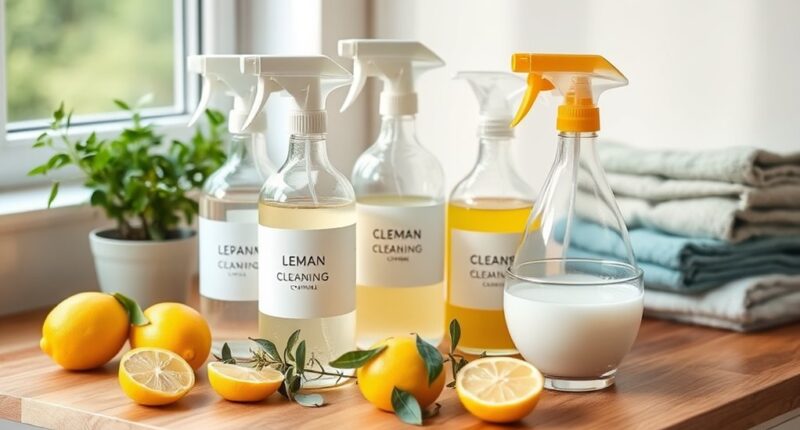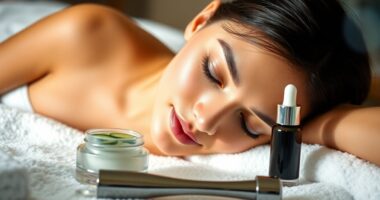If you want effective DIY natural cleaners that truly disinfect, you can use vinegar, hydrogen peroxide, and essential oils backed by scientific research. Vinegar’s acetic acid reduces microbes, while 3% hydrogen peroxide kills bacteria and some viruses. Essential oils like tea tree and eucalyptus boost antimicrobial effects. These solutions are safe, affordable, and eco-friendly options for everyday cleaning. Keep exploring to discover simple recipes and tips to make your own natural disinfectants that work.
Key Takeaways
- Vinegar and hydrogen peroxide are effective, research-backed natural disinfectants for household cleaning.
- Combining vinegar, hydrogen peroxide, and essential oils enhances antimicrobial properties safely.
- DIY cleaners with simple ingredients reduce chemical exposure and environmental impact.
- Regular use of these solutions effectively disinfects surfaces, as supported by scientific studies.
- Homemade disinfectants are cost-effective, customizable, and suitable for daily eco-friendly cleaning routines.

Many store-bought cleaners contain harsh chemicals that can harm your health and the environment. These chemicals not only irritate your skin and respiratory system but also contribute to pollution and long-term ecological damage. Fortunately, you can create effective, natural cleaning solutions right at home using eco friendly ingredients and plant based solutions. These alternatives are safer for you and better for the planet, and they can disinfect surfaces just as well as commercial products backed by research.
Switch to eco-friendly, plant-based cleaners for a safer, effective, and eco-conscious home.
Plant based solutions like vinegar, hydrogen peroxide, and essential oils are proven disinfectants. Vinegar, for instance, contains acetic acid, which has antimicrobial properties that can kill bacteria and fungi. Research shows that when used correctly, vinegar can reduce microbial presence on surfaces, making it a reliable natural disinfectant for everyday cleaning. Hydrogen peroxide is another powerful ingredient; it works by releasing oxygen, which destroys bacteria and viruses upon contact. Many studies confirm that a 3% hydrogen peroxide solution is effective against common pathogens, including influenza and certain coronaviruses. When you combine these ingredients with simple tools like spray bottles and microfiber cloths, you create a cleaning regimen that’s both safe and effective.
Using eco friendly ingredients doesn’t mean sacrificing cleaning power. Plant based solutions are versatile and affordable, making them ideal for your daily routines. For example, mixing vinegar with water creates a multipurpose cleaner suitable for kitchen counters, glass surfaces, and even bathroom fixtures. Adding a few drops of tea tree or eucalyptus essential oils enhances antimicrobial properties and leaves a fresh scent. These oils are naturally antimicrobial and have been supported by research to inhibit bacteria and mold growth. When you regularly use such solutions, you reduce your exposure to synthetic chemicals while maintaining a hygienic home environment.
Furthermore, creating your own disinfectants allows you to control the ingredients and avoid unnecessary additives or fragrances found in commercial cleaners. This not only safeguards your health but also minimizes environmental impact. Incorporating natural disinfectants backed by scientific research ensures that your cleaning routine is both effective and safe. By choosing plant based solutions and eco friendly ingredients, you’re making a conscious decision to support sustainability efforts while keeping your home clean. Plus, DIY cleaners are often more cost-effective than store-bought options, especially when you buy ingredients in bulk.
Frequently Asked Questions
Are DIY Natural Cleaners as Effective as Commercial Disinfectants?
You might wonder if DIY natural cleaners are as effective as commercial disinfectants. Their chemical composition often includes natural ingredients like vinegar or essential oils, which can be effective against some germs. However, their shelf life is typically shorter, and they may lack the potency of chemical disinfectants. While they work well for general cleaning, for thorough disinfection, especially during flu season, commercial products might offer more reliable results.
How Long Do Natural Disinfectants Need to Sit to Work?
You might worry that natural disinfectants don’t work quickly, but with proper surface contact time, they can be just as effective. To guarantee disinfection, let the cleaner sit for at least 1-10 minutes, depending on the product. Chemical stability is key; products need enough time to break down pathogens. So, be patient and follow the recommended contact time for best results, just like with commercial disinfectants.
Can Natural Cleaners Eliminate All Types of Bacteria and Viruses?
You might wonder if natural cleaners can eliminate all bacteria and viruses. While many have antibacterial properties and can inactivate certain viruses, they don’t work as universally as chemical disinfectants. Natural options often target specific pathogens, so they might not eliminate every type. For extensive virus inactivation and bacterial control, it’s best to use products proven to meet disinfecting standards, especially on high-touch surfaces.
Are Natural Disinfectants Safe for Children and Pets?
Think of natural disinfectants as gentle guardians. You want to guarantee they’re safe for your little explorers and furry friends. When choosing, look for ingredients that prioritize pediatric safety and are pet friendly. These natural cleaners can be effective without risking harm. Always check labels and opt for products specifically designed for children and pets. That way, you keep your home sparkling and safe, like a cozy fortress for your loved ones.
How Should I Store Homemade Disinfectant Solutions?
You should store homemade disinfectant solutions in a cool, dark place to maintain their effectiveness. Choose airtight, labeled containers made of glass or high-quality plastic to prevent leaks and contamination. Always keep the containers out of reach of children and pets, and ensure they’re tightly sealed after each use. Proper storage tips help conserve the disinfectant’s potency and keep your environment safe, giving you peace of mind with your homemade cleaning solutions.
Conclusion
Discovering DIY natural cleaners that truly disinfect is delightful and doable. By blending basic ingredients like vinegar, baking soda, and essential oils, you can create effective, eco-friendly products. Embrace these easy, economical solutions to eliminate germs without harsh chemicals. Remember, simple solutions can markedly strengthen your sanitary sanctuary. So, start small, stay safe, and savor the satisfaction of sustainable, science-backed cleaning. Your home will sparkle, shine, and stay sanitized — all with natural, nifty know-how!









